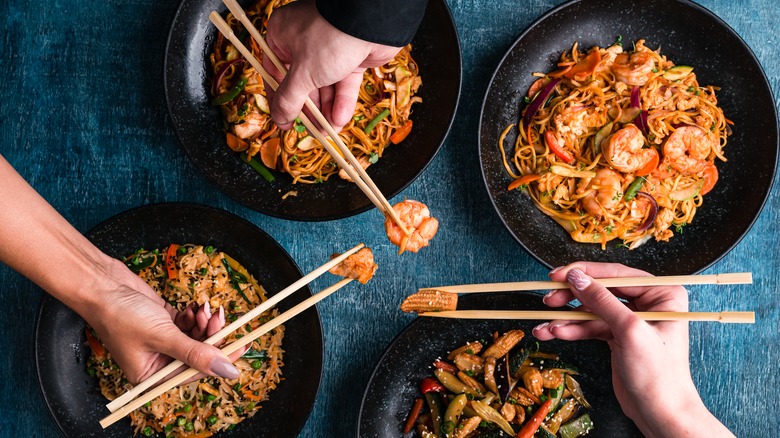1. Arrive EarlyTip. Visit the markets in the morning as vendors set up. They may offer better prices in order to get their first sale.Pro: Early shopping offers a wider selection and better bargaining opportunities.Pros: Mornings that are early may not be suitable for everyone.
2. Bring CashWhile mobile payment methods include WeChat Pay Alipay and Alipay are growing in popularity, they are becoming more popular.Cash payments ease transactions and can be a powerful instrument in negotiations.Con: Carrying lots of cash increases the chance of losing or stealing it in crowded places.
3. Learn Basic MandarinIt is possible to use phrases like "Zhege duoshao Qian?" to ask how the cost of something is. It's easier to communicate by understanding phrases such as "Zhege duoshao Qian?" (How much is this?) or "Pianyi youdian ba?" ("Can you make it less expensive?") Effective communication is important.Pro: Builds rapport with vendors and displays respect for the local culture.Pro: A limited vocabulary can be a cause of confusion.
4. Make sure you inspect your items carefullyBe sure to inspect all items for imperfections or quality issues, including clothing, electronic devices, and crafts made by hand.Pro: Ensures that you receive what you paid for and avoids any disappointment in the near future.Pros: It could be an expensive process that could make vendors angry.
5. Shop with ConfidenceIn many markets on the streets it's not uncommon to haggle. First, you should try to lower the cost by 50-70%..Pro: Bargaining can dramatically lower costs.Cons: It can be intimidating for people who are not familiar with the procedure.
6. Beware of counterfeitsTIP: Be careful with brand-name items such as bags, watches, and electronics, as they're typically copyright.Pro: No need to spend money on cheap imitations.Genuine products are difficult to come by, and are more expensive.
7. Local CustomsTips: Change your strategy by observing how locals interact, shop and negotiate with vendors.Pro: It can help you avoid making cultural blunders and helps you blend with the crowd.Con: It may take some time to master the rules and customs.
8. Keep Valuables SecureTips - Use anti-theft bags or secure your wallets and phones inside pockets to prevent being snatched in the market.Reduces theft risk in high-traffic areas.Cons: Extra cautions may feel as if they are limiting.
9. Test Before You Buy (Food)To ensure that you are receiving the highest quality product Food vendors often provide free samples of snacks and dried products.Pro: Guarantees that you are satisfied with the taste and freshness of the food.Pro: Some sellers may pressure you to buy after they have provided a sample.
10. Know the Market Then, focusTips: Each market is focused on a certain type of item like the Yuyuan Market (in Shanghai) for souvenirs and Panjiayuan (in Beijing) for antiques. Make sure to do your homework so that you achieve your shopping goals.The time you can save as well as the subject matter to the things you pay attention to is a huge advantage.Cons: It restricts spontaneity, in that you must stick to your research.
Benefits of shopping in Street MarketsUnique Finds You can find exclusive items like local snacks, or hand-crafted work that are not available in formal shops.Street markets usually have lower prices than malls shops, or shopping malls.Cultural Experience: Engaging with vendors and exploring the market is a great opportunity to get immersed in the local culture.The market provides a large variety of products, including food, clothing and souvenirs.The downsides of street market ShoppingThe likelihood of finding copyright goods is a good chance of locating fake or inferior products.The crowds at markets can be super busy during weekends or during holidays.Vendor pressure: Some vendors use aggressive sales tactics that can overwhelm the experience.There are no returns on most purchases. All sales are final, and there's very little opportunity to exchange or refunds.Use these guidelines to avoid common pitfalls while shopping in China's bustling street markets. See the top rated must-try foods in China for site tips including taste the regional flavors of China, discover the tastes of China cities, authentic Chinese culinary adventures, Chinese food you must try, regional Chinese cuisine highlights, culinary experiences across China, discover China regional dishes, discover hidden food gems in China, explore China food scene, journey through China food culture and more.

Top 10 Dining Tips Manners And Etiquette For Chinese People
1. Tip Remain patient for your host or server to guide you to your seat arrangement.Pro: Respects cultural norms as well as the authority of your host.Con: It could be difficult to identify the host in informal situations. This could cause confusion.
2. Chopsticks - How to utilize them correctlyTIP: Don't stick chopsticks up in rice since it is akin to a funeral ritual. When they are not being used, place them on the chopstick holder or place them flat on a plate or bowl.Pro: Stops accidental disobedience.Con: Learning proper chopstick etiquette might take practice for beginners.
3. Respect for the EldersLet the person who is older or more old eat first. It is common for them to be served first.Pro: Maintains traditional family and society hierarchies.Con: This practice could be overlooked or unneeded in informal situations.
4. Share DishesChinese cuisine is a communal. The dishes are placed in the middle for everyone. Do not take the last portion unless it's being given to you.Pros: It promotes the spirit of community and sharing experiences.Pro: If you're person who is picky about food, sharing could limit your choices.
5. Avoid Wasting FoodTip: Take only what you can take in, since eating food that is left on the table may be seen as irresponsible or unprofessional.Pro: Expresses gratitude to the host for their efforts.Con: Overestimating the size of your appetite may make it impossible to finish the meal.
6. Toast properlyYou can be respectful by lowering your glass a little lower than that of older or more respected people.Pro: Demonstrates politeness and understanding of the culture's structure.Con: The toasts can be difficult to remember, particularly in large crowds.
7. Don't Flip FishTips - In southern China flipping a fried fish after having eaten the first portion is considered to be bad luck since it symbolizes a sunk yacht.Pro: Avoids offending regional myths and beliefs.Cons Cons: In northern China this custom may not be a good fit, resulting in mixed practices.
8. It's okay to slurp and burpTip: Slurping noodle or soup is thought as a mark of joy and not rudeness. Chefs may allow burping to flatter others.Pro: You are able to enjoy your meal while not stressing too much about Western ways of life.Con: You might be uncomfortable because it is in conflict with the norms of your culture.
9. Chopsticks and PointingChopsticks are only used for eating. Use them only for eating.Pro: Respectful dining environment.Con: It's extremely easy to forget this rule in lively conversations.
10. Pay Attention to Who Pays the BillTip Reminder: The host in China typically demands to pay for your meal. Make an offer but be prepared to face opposition.Pro: Expresses appreciation for the generosity of the host.Pro: Being too insistent may come off as insincere or unprofessional.
The Benefits of Dining Etiquette in ChinaRespect for culture: Being respectful of local customs is a good way to build relations with the locals.Social Bonding: Following the traditions of your culture creates a sense friendship and appreciation.Avoids Missteps: Proper etiquette helps you navigate unfamiliar dining situations smoothly.An authentic experience: The practice of participating in traditional customs will enrich your experience.Pros of Following the Dining Etiquette in ChinaComplex Rules - The number of customs and regulations can be a bit confusing to those who are new.Regional Variations: Etiquette norms can differ between regions, causing potential confusion.Time-consuming: Following formalities could hinder the beginning of your meal.Unfamiliar gestures: Certain actions such as correctly using chopsticks requires a lot of practice and effort.If you are aware of these guidelines, you can follow Chinese dining manners with confidence, creating a respectful and pleasant experience for both you and your guests. Check out the top rated Chinese cuisine you need to try for site advice including China culinary hotspots, discover China regional dishes, authentic Chinese culinary adventures, Chinese food you must try, explore the best local eats in China, savor the flavors of China, explore local Chinese cuisine, journey through China food culture, authentic tastes of China, the flavors of Chinese cuisine and more.
